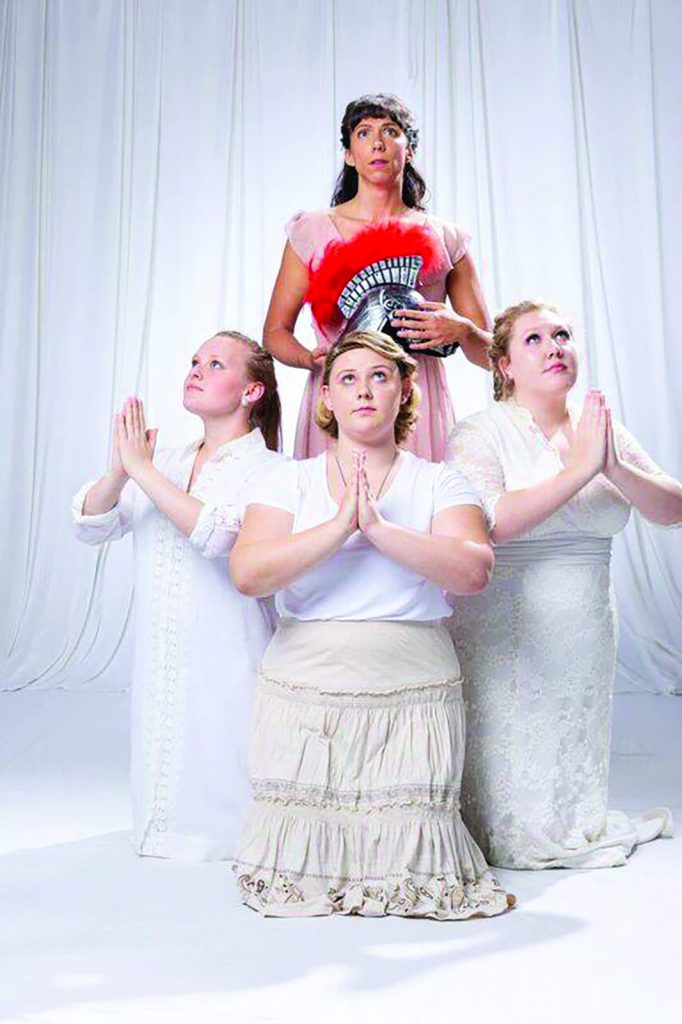Schuster Theatre’s “Trojan Women” is a powerful blend of myth and reality, past and present, hope and despair.
The play, which opened last week, is deeply rooted in Greek mythology. It was originally written by Euripides and later adapted by Ellen MacLaughlin.
As the legend goes, the ancient city of Troy was besieged for 10 years by the Greeks, due to the abduction of Helen.
Troy eventually fell when a huge wooden horse appeared outside the gates and was pulled into the heart of the city. Unbeknownst to the Trojans, the horse was actually filled with Greek soldiers who poured out at night and conquered the city.
This is where “Trojan Women” opens. The Schuster Theatre production begins with simulated warfare between the Greeks and Trojans in slow motion. An eerily futuristic soundtrack thumps in the background and a haunting video of a dark horse running through a burning city is projected above the actors.
The combination of ancient events and modern media is a consistent thread running throughout Gannon’s adaptation of the play. Blending these seemingly disjointed elements together makes a powerful statement about the way war has permeated nearly every culture through time and space.
The women of Troy have just witnessed the brutal slaughter of their husbands, sons, and brothers and are now waiting to be captured and enslaved by the Greek victors. They must cope with their many losses and grapple with the new roles they will be forced into within a few hours.
These women are not one-dimensional damsels in distress. They are alternatively stonefaced, shattered, hopeful, strong, cruel, selfish, supportive, afraid; they are a microcosm of the range of human behavior under horrific circumstances.
The talented actresses who portray these women include Jessica Annunziata, Isa Foltz, Petra Shearer, Riley Hessel, Amy Benkovich, Camryn Grey and Cheyenne Stefano.
Annunziata shines as Hecuba, the queen of Troy, who fights to maintain her dignity even as she watches her city fall to ashes.
Foltz delivers a committed performance as Hecuba’s daughter Cassandra, who slips deeper into madness as the hour of their capture approaches.
Shearer tugs at the audience’s heartstrings as Hecuba’s daughter-in-law Andromache, who clings to the hope that one day she will find happiness for her and her young son, even though she has lost her husband.
Finally, Stefano gives a nuanced performance as the Greek Helen, who is detested by the Trojan women for her beauty, vanity and callousness but who reveals surprising depths as the play goes on.
While the Trojan War likely did not happen exactly the way “Trojan Women” describes it, a city fitting the description of Troy was destroyed around 700 BC. And acts of warfare and violence, particularly against women and children, still happen around the world every day.
Riley Hessel, one of the Trojan women, urges fellow students, faculty and staff to see the play.
“‘Trojan Women’ is a really relevant play because of everything that is going on with war, and [the play] also depicts strong female characters,” Hessel said. “War and women are two topics that I think are super important, especially in today’s society.”
Come see the buzz surrounding this talented cast and crew.
Additional performances are at 8 p.m. Thursday through Saturday and 2 p.m. Sunday. Tickets are $5 with your Gannon ID.
ALEX STAUFF
[email protected]








